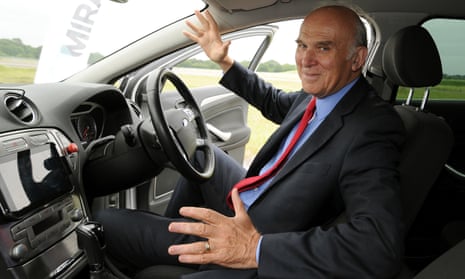Theresa May’s assurances to Nissan that the car industry will remain competitive after Brexit point to a promise that the UK will be staying in the EU customs union, according to Sir Vince Cable.
Cable, who was business secretary throughout the coalition government, said this was the most probable rationale as the industry would need assurances there would be no tariff regime and that its supply chain would not be subject to rules of origin checks.
What is the customs union?
The European Union is a customs union. It allows free trade between countries inside it and allows imports in to the area by setting common tariffs. The area does not just include EU members. For instance, Turkey is part of the customs union for manufactured goods but not services or agriculture. The single market involves deeper integration of free movement of people, goods, services and money. This means laws need to be aligned. Some countries have access to the single market without being members of the EU’s customs union.
If the former Liberal Democrat MP is correct, it would make the job of Liam Fox, the international trade secretary, redundant because membership of the customs union means the UK could not strike its own independent trade deals.
It emerged on Thursday that the car industry has been given concrete assurances that it will remain competitive and not be subject to tariffs when the UK leaves the EU, enabling Nissan to announce it planned to build two new models at its Sunderland plant.
The government and Nissan have said there was no “sweetheart deal” but refused to deny that a written guarantee was offered that gave assurances the company would not be disadvantaged by May’s Brexit policy. Pressed repeatedly on whether there was a letter, No 10 said there were “all forms of communications”.
Cable told the Guardian: “The only way these big supply chain companies are going to commit themselves to Britain – and Nissan is the biggest – is that if they give them guarantees they are not going to be caught up in rules of origin problems, which is what happens if you leave the customs union.
“And if you stay in the customs union, which I think is what we’re talking about, what is the role of Dr Fox? Because it means you no longer have an independent trade policy.”
He added: “If you leave a customs union you, by definition, will have tariff regimes and have to validate all the flows of widgets going backwards or forwards. A customs union is not an incredibly big deal and it is not more radical than the single market. Turkey is in a customs union with the EU. But it does mean you can’t go round the world doing separate bilateral deals.”
Cable, who lost his seat at the last election, said the only alternative to staying in the customs union would be a specific agreement for the automotive industry, which the EU would be unlikely to want to negotiate.
“I am pretty certain the car industry will be operating together. The only alternative to what I have suggested is that they are going to get a separate sectoral agreement for cars. But I cannot see that happening,” Cable added. “Why would the EU want to do that? The same problems arise for aerospace, for pharmaceuticals. GSK yesterday was worrying about their supply chain. The only way to make the promise stick is to stay in the customs union.”
He said the decision taken by May and Greg Clark, the business secretary, to provide such assurances to the car industry would be “very tricky stuff for the Brexit people because the hardliners want us to leave the customs union as well as the single market”.
Cable said: “I was involved in discussions with Nissan in their last big round of investment decisions. Even under the coalition they were toying with doing it in France. I find it impossible to believe they would go ahead without some pretty copper-bottomed promises. These guys do not go making decisions on the basis of vague assurances. That is not the way they operate.”
May and Clark are under pressure to reveal the terms of their assurances to Nissan, which were given behind closed doors.
Keir Starmer, the shadow Brexit secretary, has called on the government to explain fully the deal it has agreed with Nissan.
“It’s welcome that the government have done a deal with Nissan that protects jobs and supports the local community and economy,” he said. “But that deal needs to be accompanied by transparency and accountability. We can’t have the government doing deals that affect jobs and the future of our economy without telling the public or parliament what the basic terms are.
“They now need to spell that out and strike a wider deal that gives certainty to businesses, workers and communities across the country.”
The prime minister has previously hinted she could be open to at least some sectors staying in the customs union by saying it is not a “binary choice” and making clear she does not want a hard border between Northern Ireland with the Republic of Ireland.
A further signal came on Thursday from a government business spokeswoman in the Lords. Lady Manzoor said: “It is possible to be in a customs union and still strike trade deals.”

Comments (…)
Sign in or create your Guardian account to join the discussion